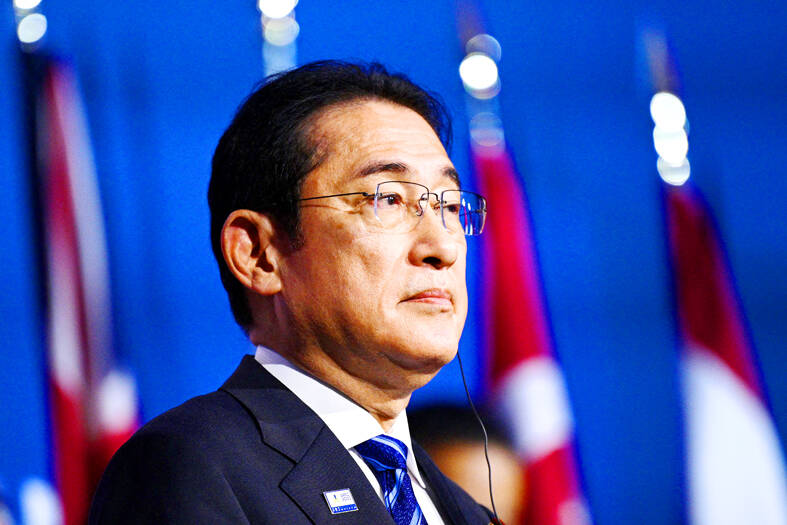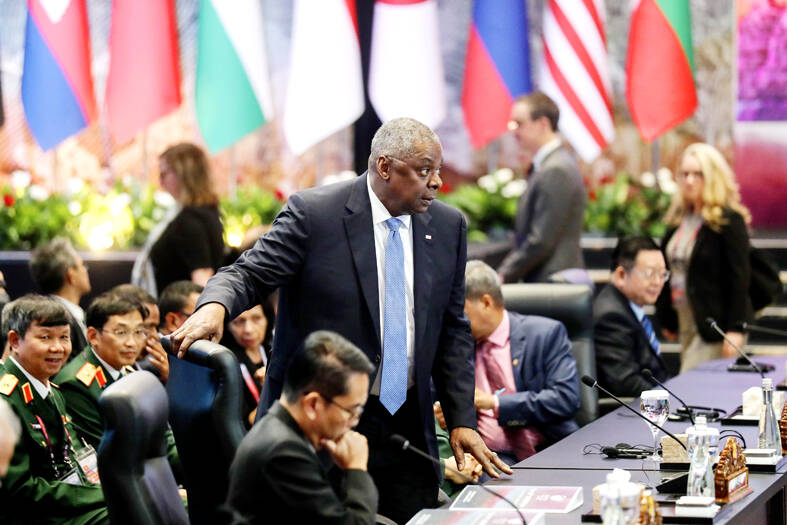Japanese Prime Minister Fumio Kishida on Thursday underscored the importance of peace and stability in the Taiwan Strait during a meeting with Chinese President Xi Jinping (習近平), while US Secretary of Defense Lloyd Austin reaffirmed the US’ commitment to support Taiwan’s self-defense capacity.
Kishida met with Xi for about an hour in San Francisco, where both leaders attended the APEC summit, the Japanese Ministry of Foreign Affairs said in a news release.
Kishida reiterated that cross-strait peace and stability are “extremely important” to the international community, including Japan, it said.

Photo: AFP
In Taipei, the Ministry of Foreign Affairs yesterday expressed gratitude to the Japanese leader for voicing concern over Taiwanese issues, adding that safeguarding peace in the Taiwan Strait has become the international consensus.
Meanwhile, Austin told reporters on the sidelines of the ASEAN Defense Ministers’ Plus conference in Jakarta that “with the Taiwan Relations Act, we are committed to doing what’s necessary to help Taiwan acquire the means to defend itself,” the Nikkei Asia reported yesterday.
Austin’s comment came after US President Joe Biden met with Xi on Wednesday on the sidelines of the APEC summit in San Francisco.

Photo: EPA-EFE
During the meeting, Xi urged the US to demonstrate its stance of not supporting Taiwanese independence through concrete action and to stop arming Taiwan, China’s state-run Xinhua news agency reported.
However, Biden said that the US would continue to arm Taiwan as a deterrent against any attempt by China to use force to invade the nation, The Associated Press reported.
“I don’t think that anything ... that both leaders discussed today [Wednesday] would cause that to move in a different direction,” the Nikkei Asia quoted Austin as saying.
Austin welcomed the resumption of military-to-military communication and the intention to stabilize the tense US-China relationship after their leaders’ meeting, but added that Washington would remain vigilant on the threat posed by China, it reported.
Austin reiterated that any unilateral change of the “status quo” in the Taiwan Strait is “undesirable,” as such a conflict would have global impacts, it said.
The US would keep expediting the delivery of weapons to Taiwan and has been working to resolve a backlog of arms orders as it assesses China’s capability to invade Taiwan, he said.
The ministry welcomed Austin’s statement, saying that the Biden administration has repeatedly stressed its “rock solid” security commitment to Taiwan at several bilateral and multilateral events since Biden took office in 2021.
Austin’s remark further demonstrated the US’ firm support for the safety of Taiwan, and peace and stability in the Taiwan Strait, it said.
As a responsible member of the Indo-Pacific region and the international community, Taiwan is to continue to strengthen its self-defense capabilities and bolster the Taiwan-US security partnership, it said.
The nation is also to work closely with like-minded countries to jointly safeguard cross-strait peace and stability, as well as freedom, openness and prosperity in the Indo-Pacific region, the ministry said.
In addition to calling on the US to stop arming Taiwan, Xi said that Washington should “support China’s peaceful reunification” with Taiwan, Xinhua reported.
US National Security Council Senior Director for China and Taiwan Affairs Sarah Beran yesterday told an online briefing that Biden “made clear” that Chinese military coercion against Taiwan is “absolutely unacceptable.”
Not supporting Taiwanese independence while underscoring the importance of maintaining peace and stability as well as the “status quo” in the Taiwan Strait has long been the US policy, she said, adding: “I think we’re very clear that our policy has not changed.”
Regarding January’s presidential and legislative elections, US National Security Council Coordinator for the Indo-Pacific Kurt Campbell on Thursday told Taiwanese media that Biden spoke about Taiwan’s elections during his discussions with Xi.
“It was very clear with President Xi that our determination to maintain peace and stability across the Taiwan Strait remains strong,” Campbell said, adding that Biden warned China not to interfere in Taiwan’s elections, and expressed his belief in the value of Taiwan’s democracy and elections.
Additional reporting by CNA

Conflict with Taiwan could leave China with “massive economic disruption, catastrophic military losses, significant social unrest, and devastating sanctions,” a US think tank said in a report released on Monday. The German Marshall Fund released a report titled If China Attacks Taiwan: The Consequences for China of “Minor Conflict” and “Major War” Scenarios. The report details the “massive” economic, military, social and international costs to China in the event of a minor conflict or major war with Taiwan, estimating that the Chinese People’s Liberation Army (PLA) could sustain losses of more than half of its active-duty ground forces, including 100,000 troops. Understanding Chinese

The Ministry of Foreign Affairs (MOFA) yesterday said it is closely monitoring developments in Venezuela, and would continue to cooperate with democratic allies and work together for regional and global security, stability, and prosperity. The remarks came after the US on Saturday launched a series of airstrikes in Venezuela and kidnapped Venezuelan President Nicolas Maduro, who was later flown to New York along with his wife. The pair face US charges related to drug trafficking and alleged cooperation with gangs designated as terrorist organizations. Maduro has denied the allegations. The ministry said that it is closely monitoring the political and economic situation

‘SLICING METHOD’: In the event of a blockade, the China Coast Guard would intercept Taiwanese ships while its navy would seek to deter foreign intervention China’s military drills around Taiwan this week signaled potential strategies to cut the nation off from energy supplies and foreign military assistance, a US think tank report said. The Chinese People’s Liberation Army (PLA) conducted what it called “Justice Mission 2025” exercises from Monday to Tuesday in five maritime zones and airspace around Taiwan, calling them a warning to “Taiwanese independence” forces. In a report released on Wednesday, the Institute for the Study of War said the exercises effectively simulated blocking shipping routes to major port cities, including Kaohsiung, Keelung and Hualien. Taiwan would be highly vulnerable under such a blockade, because it

UNRELENTING: China attempted cyberattacks on Taiwan’s critical infrastructure 2.63 million times per day last year, up from 1.23 million in 2023, the NSB said China’s cyberarmy has long engaged in cyberattacks against Taiwan’s critical infrastructure, employing diverse and evolving tactics, the National Security Bureau (NSB) said yesterday, adding that cyberattacks on critical energy infrastructure last year increased 10-fold compared with the previous year. The NSB yesterday released a report titled Analysis on China’s Cyber Threats to Taiwan’s Critical Infrastructure in 2025, outlining the number of cyberattacks, major tactics and hacker groups. Taiwan’s national intelligence community identified a large number of cybersecurity incidents last year, the bureau said in a statement. China’s cyberarmy last year launched an average of 2.63 million intrusion attempts per day targeting Taiwan’s critical